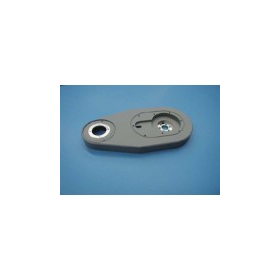To use Teflon coating for a long time, not only selection and processing technology are important, but also quality inspection. Let me introduce Yoshida SKT's quality inspection.
Why is it a problem if there are pinholes in the Teflon coating film in the first place? In a typical fluororesin coating (thickness: 20-50 μm), there are countless holes (pinholes) that are invisible to the eye and reach the substrate. For applications that require non-stick or slippery properties, these pinholes rarely have a negative impact on performance. However, in applications where corrosion resistance is required, chemicals can reach the substrate (metal) through the pinholes, causing corrosion and leading to holes or causing the coating to peel off. To eliminate pinholes, the coating can be thickened by applying multiple layers, ensuring that there are no pinholes that connect the coating surface to the substrate. At Yoshida SKT, we conduct inspections using insulation resistance meters, pinhole testers, and chemical detection methods according to the coating specifications and substrates. These methods are non-destructive tests that do not damage the coating film. *For more details on pinhole inspection, please visit our website via the link or contact us.*
Inquire About This Product
Related Videos
basic information
For more details, please contact us.
Price information
For more details, please contact us.
Delivery Time
Applications/Examples of results
For more details, please contact us.
catalog(2)
Download All CatalogsCompany information
To maximize the performance of manufacturing equipment and machine parts, Yoshida SKT derives the "optimal solution" tailored to our customers from hundreds of surface treatment technologies. - Decreased productivity due to adhesive troubles - Instability in product quality due to friction - Early deterioration of equipment due to corrosion We respond to these challenges in the manufacturing field with our extensive track record and reliable technical expertise. In 1963, we began fluoropolymer processing. In 1968, we signed a licensing agreement with DuPont (now Chemours), supporting manufacturing innovations for over 2,000 customers across various industries, from automotive to medical and aerospace. Furthermore, in 2024, we are focusing on the development of next-generation products, such as PFAS-free coatings, contributing to the advancement of sustainable manufacturing. With a three-base system in Nagoya, Tokyo, and Yamaguchi, we flexibly respond to both mass production and custom orders. Our consistent quality management system ensures that we deliver reliable quality. For solving challenges in the manufacturing field, trust the surface treatment experts at Yoshida SKT.












